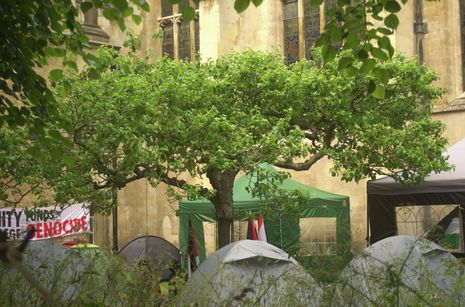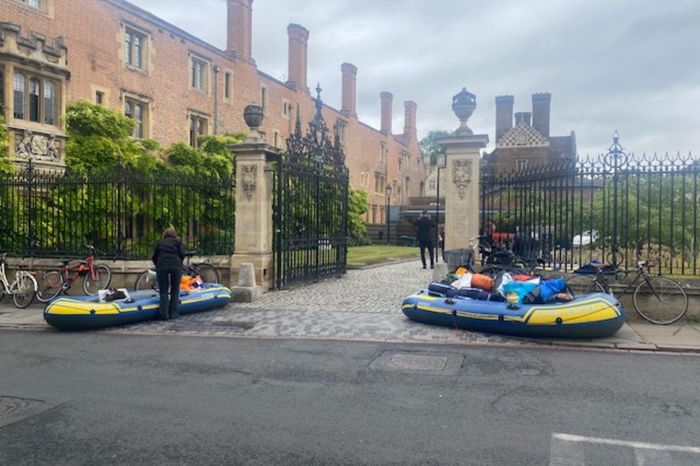Uni splashed over £400,000 on controversial protest lawyers
Universities across the country spent almost £1.4 million on legal advice to tackle encampments

The University of Cambridge and its colleges spent over £400,000 on legal action to restrict protest on campus – the most of any university in the UK.
The central University, along with Trinity College and St John’s College, paid law firms £402,868 to help tackle encampments on their sites according to freedom of information requests. This included obtaining high court injunctions to ban protests at the University’s head offices and College sites, a move that was labelled an “authoritarian reflex” by a senior academic.
Universities across the country spent almost £1.4 million on legal advice to tackle encampments, with elite Russell group institutions making up the vast majority of the spend.
Cambridge currently holds a 12 month injunction against all protests on its Old Schools site, which hosts graduations and the University’s administrative offices, and Greenwich House, its financial centre.
The sites had been subject to multiple encampments over 2024 and 2025, with Cambridge for Palestine (C4P) occupying the Senate House lawn in summer 2024 to put pressure on the University to cut ties with arms companies.
The encampments were eventually disbanded after the University agreed to review all of their arms investments with a student working group.
C4P then occupied Greenwich House and the Senate House in late 2024 after they accused the University of backtracking on their promises to divest from companies associated with Israel.
The findings of the working group were published last month, recommending the University to divest from all companies involved in the production of weapons illegal in the UK.
The injunctions were only obtained after a lengthy legal battle, with an original request for a 5-year ban on pro-Palestine protests at the sites in February being rejected by the High Court. Mr Justice Fordham, the judge on the case, instead issued a 48 hour injunction to prevent disruption to graduations occurring that week.
But the University would later be granted a 12 month injunction on all protests at the sites in July, following a string of hearings.
Trinity and St John’s requested injunctions following occupations by C4P on their sites in May, with the group again accusing the University of “watering down” their commitment to divest from arms.
The Colleges obtained temporary injunctions within 48 hours of the occupations, and were later granted a 12 month protest ban.
Magdalene College also obtained an injunction against protesters following an encampment flotilla which occupied their riverside court in June. However, the College refused to disclose the amount they spent on legal fees, claiming that doing so would harm their ‘commercial interests’.
Both Trinity and John’s originally claimed that disclosing their spending would endanger ‘commercial interests’ but eventually conceded that publishing figures was in the public interest.
The use of injunctions to tackle encampments has been widely criticised by Cambridge’s academics, with Professor Jason Scott Warren, a member of University Council, labelling them “repressive authoritarianism”.
Scott Warren is currently leading a campaign to prevent the University from pursuing legal action against protesters, with a motion to limit the ability of the University to pursue injunctions without approval from its governing body being voted on November 24th.
Cambridge has consistently denied any allegations that their injunctions limit freedom to protest, with a University spokesperson telling Varsity they “have sought injunctions to protect the right of our students to graduate and for staff to carry out their work. It does not restrict the important right to legal protest. There are many ways protests can take place and voices can be heard.”
The original applications for injunctions also claimed that encampments cost the University “at least £230,000” in additional security, cleaning the sites, and pursuing non-disclosure orders against protesters who accessed confidential documents in Greenwich house.
The costly legal battles also come at a time of significant stress for Cambridge’s finances, after they were forced to make 5% cuts across all departments to tackle a funding deficit of over £50 million.
Across the country, Queen Mary’s University of London and Cardiff University boasted the second and third highest spends on protest lawyers, racking up fees of £246,513 and £190,600 respectively.
Multiple high-profile Universities that pursued injunctions also rejected requests for information. Among those was the University of London, who claimed that disclosing their legal spend would “provide impetus for further inaccurate public and media commentary […] designed to put undue pressure on the University to discontinue” their legal action.
This also comes following OfS guidelines on tackling protests, which advised against “sweeping” protests bans on campus.
The guidelines lay out the “practicable steps” universities should take to ensure legal free speech among staff and students, and how complaints about breaches of free speech should be dealt with.
This included suggesting that legal injunctions could be used to protect specific sites used for graduations from protests. The advice warned against stricter measures, such as a 12-month ban on pro-Palestine protests on the lawn and university spaces within a 400 yard radius.
A spokesperson for the OfS told Varsity: “Freedom of speech includes the right to peaceful protest within the law. This right is fundamental, but it does not extend to unlawful expressions of support for terrorism or proscribed organisations.
“Our guidance also recognises that institutions may need to regulate the time, place, and manner of protests or demonstrations. It is for universities to decide how to provide themselves with assurances their actions are in line with their free speech requirements, including when it may be appropriate to seek legal advice,” they continued.
 News / Colleges charge different rents for the same Castle Street accommodation2 March 2026
News / Colleges charge different rents for the same Castle Street accommodation2 March 2026 News / King’s hosts open iftar for Ramadan3 March 2026
News / King’s hosts open iftar for Ramadan3 March 2026 Theatre / Lunatics and leisure centres 4 March 2026
Theatre / Lunatics and leisure centres 4 March 2026 News / Angela Merkel among Cambridge honorary degree nominees27 February 2026
News / Angela Merkel among Cambridge honorary degree nominees27 February 2026 News / News in Brief: waterworks, wine woes, and workplace wins 1 March 2026
News / News in Brief: waterworks, wine woes, and workplace wins 1 March 2026








